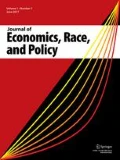In the late summer and early fall of 2008, the festering crisis in the American financial system culminated in what was arguably the most severe financial upheaval in world history.Footnote 1 The crisis and its associated “Great Recession” had profound effects on many aspects of the American economy. This special issue focuses on how the crisis and recession affected various racial and ethnic groups within the USA across various dimensions. More specifically, the ten papers in this issue can be loosely grouped into five broad categories related to racial and ethnic concerns among the following topics: finance and monetary policy, unemployment and its broader effects, inequality, education, and racial attitudes.Footnote 2
The first paper of the issue by Won Lee and Samuel Myers explores the topic of lender discrimination in mortgage markets. They find that disparities in lending can explain differences in home-ownership rates across races. They further demonstrate that these disparities increased during the Great Recession. In the issue’s second paper, Ejindu Ume and Miesha Williams examine how monetary policy during the Great Recession had a differential effect on the labor market conditions of blacks and whites. They find that in the long run, black employment was more sensitive than white employment to changes in monetary policy with the converse being true in the short run.
The next set of papers examines how labor market conditions may affect racial groups differently. Donna Feir and Rob Gillezeau study how the Great Recession affected labor market outcomes for Native Americans. They show that the Great Recession caused many Native Americans to return to their traditional homelands and withdraw from the labor market. They also find that the recession had a smaller effect on labor market conditions on Native American reservations compared to other areas. Timothy Diette, Arthur Goldsmith, Darrick Hamilton, and William Darity Jr. examine the effect that unemployment may have on mental health. They find that the effect of short-term unemployment on psychological distress is significantly greater for blacks than whites. As such, the Great Recession likely had a more deleterious effect on mental health in the black community compared to whites. Pallab Ghosh investigates the causes of the post-recession decrease in crime rates. He finds approximately one quarter of the decrease in crime rates can be explained by changes in the unemployment rate of unskilled male workers.
The next two papers in the issue focus on the effect that the crisis and recession may have had on inequality. Mehmet Yaya finds that in addition to an increase in overall income inequality, the Great Recession also resulted in increased inequality within and between racial and ethnic groups. Additionally, these increases were not uniform; Asians and blacks experienced a larger increase in inequality than Hispanics, while the increase in inequality among whites was only moderate. Ryan Compton, Daniel Giedeman, and Leslie Muller focus their attention on the wealth of black and white families in the wake of the financial crisis. They show that while both black and white families experienced negative wealth consequences as a result of the crisis and recession, the effects on black family wealth were more severe and longer lasting than on the wealth of white families.
The effect that economic downturns may have on education and the formation of human capital is the focus of the next set of papers. Vicki Bogan and Di Wuy study the connection between macroeconomic conditions and the pursuit of graduate-level education. They demonstrate that graduate school enrollment is countercyclical with respect to the business cycle and that the size of these effects is larger for some minority groups. Alberto Ortega and Omari H. Swinton examine how the business cycle affects the funding of historically black colleges and universities. They find that these institutions typically receive less funding than other institutions and that this disparity worsens during economic downturns.
In the final paper of this special issue, Gabriel Sanchez investigates whether the Great Recession influenced the racial attitudes of non-Hispanic whites. Specifically, Sanchez shows that in the wake of the recession, consumer sentiment was negatively associated with the probability that non-Hispanic whites thought the USA was spending too much to improve the living conditions of blacks. This negative association did not exist prior to the Great Recession.
I am hopeful that readers of this special issue will find its contents thought-provoking and informative. While the issue certainly does not address all of the important ways that the financial crisis and recession may have had racial and ethnic effects, I am confident that it does provide at least a glimpse at some of the ways these effects may have manifested. As such, I anticipate that additional researchers will continue to further explore the subject.
Finally, I would like to thank all the authors who contributed to this special issue of the Journal of Economics, Race, and Policy. I also appreciate the efforts of JERP editor, Gary A. Hoover, whose direction and guidance were invaluable.
Notes
For example, in testimony to the Financial Crisis Inquiry Commission, Ben Bernanke stated, “I honestly believe that September and October of 2008 was the worst financial crisis in global history, including the Great Depression.” (United States, FCIC, p. 354)
All of these papers were submitted to the Journal of Economics, Race, and Policy without any guarantee of publication. Submitted papers went through the regular reviewing process, and were revised in response to comments by the anonymous, external reviewers. Not all papers that were submitted for this special issue were accepted for inclusion.
Author information
Authors and Affiliations
Corresponding author
Rights and permissions
About this article
Cite this article
Giedeman, D.C. Introduction to the Special Issue: The Effects of the 2007-2009 Financial Crisis and Great Recession Across Racial and Ethnic Groups. J Econ Race Policy 1, 45–46 (2018). https://doi.org/10.1007/s41996-018-0013-9
Published:
Issue Date:
DOI: https://doi.org/10.1007/s41996-018-0013-9

